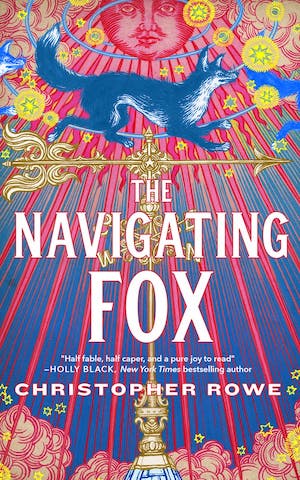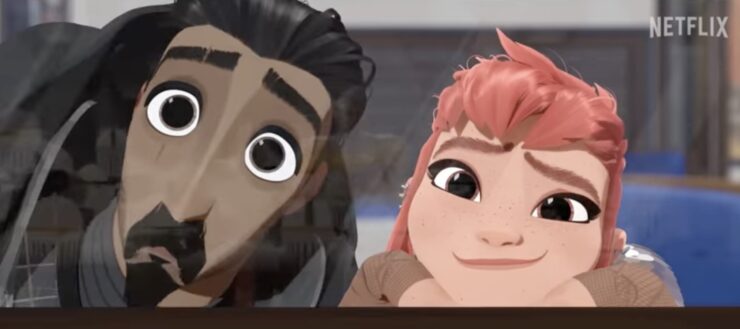It’s a wonder Nimona ever got made. The tale of a puckish, chaotic, shapeshifting would-be sidekick and a presumed-evil knight began life as a Tumblr comic by ND Stevenson when he was in college. It transformed into a graphic novel in 2015 and was a finalist for the National Book Award. The movie rights got picked up, then languished, then ran into trouble when the studio making the film got sold, and the film was canceled.
In swept Netflix and Annapurna, who switched things up again, turning the movie into a streaming release. Apparently there were promotional plastic pink rhinos and everything.
I remind you of all of this because backstory is important, and because it’s kind of delicious that a story about transformation—of bodies, hearts, ideals, countries—has been through so many forms. Like the best adaptations, Nimona the movie is not Nimona the book, but it has the same heart: one that looks for the truth of things, whatever shape that truth may take.
Ballister Boldheart (née Blackheart in Stevenson’s book, and voiced by Riz Ahmed) is not like the other knights. He’s a street kid who nonetheless trained with the scions of power. (In the parlance of another YA tale, he’s the Katniss to all these tiresome, wealthy District 1 tributes.) When the day comes that the trainees are set to be officially knighted, treachery strikes, and Boldheart appears to murder the queen who always believed in him, who was trying to change the world by making him a knight. His beloved, fellow knight Ambrosius Goldenloin (Eugene Lee Yang), reacts instantly to the threat, and cuts off Ballister’s arm.
Hard to beat that, as breakups go.
But first, a different sort of backstory. In Nimona-the-book, there’s a one-page reference to a knight named Gloreth, who slayed a horrible monster way back in ancient times. On screen, Gloreth’s story becomes the founding myth of a nation. Proud Goldenloin is one of her descendants. Her sword-wielding statue stands in place of pride in the city, which is bounded by high walls. Out there, there be dragons, or maybe worse things (or so the story goes). Inside the walls, the Institute keeps the peace, the firm hand of the Director (Frances Conroy) at the wheel.
Creating a mythology for this peculiar realm—which has awesome bionic arms and knights in armor, olde timey vibes and Times Square-worthy giant screens (“if you see something, slay something”)—is a beautiful way of deepening the world and giving it history. It’s been there for ages, but it hasn’t always been this way. It’s a reminder that things always change, and that anything can be perceived as normal, as home, if you tell the right story about it.
Few of those things change as much as Nimona (Chloë Grace Moretz). To her, banished Boldheart is perfect. Perfectly in need of a sidekick, that is. (All the best villains have them, don’t they? Or is it the best heroes? Oh, who can keep track.) She steamrolls into his life, insisting that she can help—which she probably can, if she can ever stop interpreting absolutely everything through the lens of us vs. them. “Us” is her and Ballister. “Them” is everybody else. It’s an entirely understandable way for her to see the world, given that when people see her transform—into a rhino, an ostrich, a whale, a turtle, an otter (bless whoever wrote the bit about sea otters versus river otters), a bird, a you-name-it—they tend to scream and start running the other way.
Buy the Book


The Navigating Fox
Ballister still yearns to be one of them, even as everything about him is othered by the Institution: a street kid, a brown kid, an amputee. Knighthood was belonging, and being loved, not just by the people but by Goldenloin, who has his own secondary struggle with what the Director tells him about his ex and what he actually knows about the man he loves. Their relationship can’t really get a ton of screentime, what with the whole regicide accusation, but it feels solid and sweet and lived-in.
Nimona is so many things at once: a pain in the ass, a lovable scamp, a destructive force of absolute chaos, a loyal sidekick, a smart-ass, and a heartbroken kid (or not exactly a kid, but let’s not get nitpicky about what age means to shapeshifters). She’s hilarious and mean and manic, and yet you want to wrap her up in a blanket and find some really good hot cocoa and sit her down and just tell her to breathe. All that charisma and madcap cheer masks a world of hurt that the film explores in a way that cleverly ties together this world’s mythology with Nimona’s own story. Any foundational myth is, at heart, a story that’s been told and retold and given power through those retellings. But who has it taken power from?
With Nimona’s enthusiastic help, Ballister digs into the mystery of who really killed the queen. En route to that discovery, Ballister and Nimona clash with the other knights (Beck Bennett stands out as a wonderfully odious Sir Thoddeus Sureblade), experience hijinks galore, have a board game scene straight out of the book, and push each other. Nimona wants chaos. Ballister wants her to chill out and do fewer murders. In between those desires is a place where they can both be themselves. No villains, no monsters, no heroes.
I was a little skeptical about Nimona, I admit. The trailers leaned corporate-grrl-power, and Nimona herself is not as much of an oddball on screen as she is on the page: Not as punky, not as chubby, not as weird. Not in her appearance, anyway: As it turns out, the personality is all there. The design concessions to a modern pop culture in which all animated characters that might sort of possibly be for the youth must be cute and outrageously wide-eyed, well, I can’t entirely blame the filmmakers for that, though I wish fewer edges had been sanded off.
The entire film has clearly been made with care, something that comes through in every interview with co-directors Troy Quane and Nick Bruno. The directors, the screenwriters (Robert L. Baird and Lloyd Taylor have screenplay credit along a host of story-writers), and the animators created an unusual, beautifully diverse fantasy world where the central problem is powerfully resonant: The way we tell a story isn’t neutral. Good and evil are a matter of perspective. And when one story has been told, over and over, for a very long time, it’s probably a good idea to question it. Does anyone really know what a monster is?
Or, as Catherynne M. Valente put it, in The Girl Who Soared Over Fairyland and Cut the Moon in Two
What others call you, you become.
It’s a terrible magic that everyone can do—so do it. Call yourself what you wish to become.
Valente’s sly narrator also says, “Living is a paragraph, constantly rewritten,” and I thought about both of these bits as I watched Nimona, moved and delighted beyond expectations. This terrible magic infuses this story: Who gets called a villain, a hero, a sidekick? Who gets hurt in the process? What institutions have been upheld well beyond their use-by date? How many ways are power and the idea of goodness used against those who don’t look or act like everyone else?
And how many ways do we find to squash down people who take joy in their difference? When Ballister asks what Nimona calls “small-minded” questions about her shapeshifting—questions that echo real-world queries every oddball, queer, outcast kid has faced—she refuses to give him small-minded answers. She’s Nimona. That’s what matters. She feels bad if she doesn’t use her power. It’s her. But no joy can stand against endless cruelty. Not without acceptance, and not without love.
This is where I need to talk about the ending for a minute, so SPOILERS IN THE NEXT THREE PARAGRAPHS:
The end of Nimona the book is bittersweetly ambiguous, and also outright heartbreaking. The end of the movie is brave and honest in the way it approaches Nimona’s darkest moment (which has nothing to do with “monstrousness” and everything to do with the cruelty of others). Ballister reaches out to Nimona in a stunningly animated moment of rich empathy. He sees her, he cares about her, he wants her to live.
And then she makes the choice to sacrifice herself and stop a terrible weapon from killing Ballister—and everyone else. For long minutes, it seems like she’s gone, having died doing the noble, heroic thing. Everyone loves her. There are memorials and everything.
In the final scene, we find out she’s not gone. But we get only a second to accept this before the movie ends, and it feels crappy. It feels crappy because you shouldn’t have to sacrifice yourself in order to be loved. The way the movie presents this is complicated—she lives, and she does what she says she’s going to do: rewrite the story of how she’s perceived. It’s her choice, but that almost seems to underscore the idea that that’s what it takes to be accepted and loved. It sits oddly with me.
END SPOILERS
Stevenson, who came out as transmasculine, nonbinary, and bigender in the years since publishing the comic, has been open about how—though he didn’t realize it at the time—the story is clearly metaphorical. He told The New York Times, “Narratives have been my way of exploring those identities, even as allegory.” The movie doesn’t require that you see it as a trans allegory, but it welcomes that reading. And it’s clear about what hatred and fear—in a fantastical world, or in our own—do to a person.
The ending felt like when you eat a delicious dessert and then somehow there’s a peculiar chemical aftertaste. Because the rest of this movie is magic. It’s more queer than the book; it’s not shy about how people in power can forget that everyone without power is still a person; the voice cast is spectacular across the board; and the little throwaway lines are actually, genuinely, snort-into-your-beverage funny. Did I want there to be some actual metal on the soundtrack given that Nimona likes to say “Metal” like it’s the highest possible compliment? Yeah, I did. (The anxious pulse of Metric’s “Gold Guns Girls” fits perfectly in one scene.) But I also grinned like a fool when Ballister says “Aaaand now you’re a boy” to a shifting Nimona, who smirks maniacally and says, “I am today.”
There are stories about acceptance, and then there are stories that demand acceptance. Nimona is what Nimona wants to be, and Nimona deserves that freedom.
Molly Templeton lives and writes in Oregon, and spends as much time as possible in the woods. Sometimes she talks about books on Twitter.










